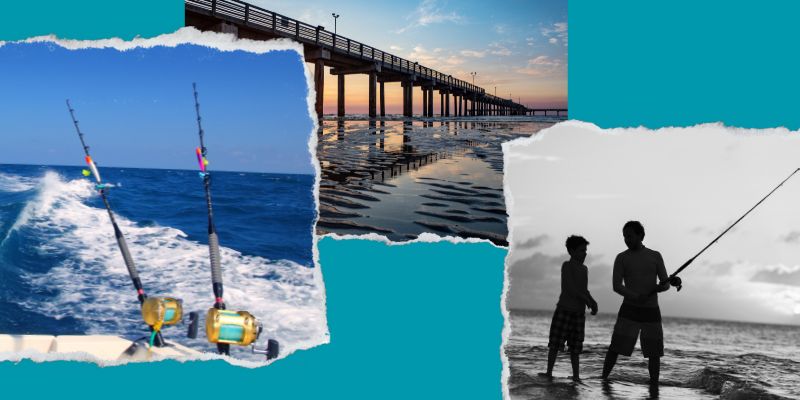Saltwater fishing offers a dynamic and exhilarating alternative to freshwater fishing, presenting unique challenges and rewarding experiences for anglers of all skill levels. Unlike the often tranquil and predictable settings of freshwater environments, saltwater fishing introduces a rugged and vast arena where the conditions are as varied as the fish that inhabit them. Let’s dive into the essential saltwater fishing tips for casting from piers, the shore, and open waters, highlighting the benefits these techniques offer to both beginners and seasoned fishermen.
The Allure of Saltwater Pier Fishing in Florida
Pier fishing is particularly popular in Florida, where piers and jetties dot the coastline, offering accessible fishing spots for those without a boat. Florida’s regulations for pier fishing are designed to preserve marine life and ensure safety, requiring anglers to adhere to specific licensing and conduct rules.
The challenge of saltwater pier fishing lies in the limited space and structure which can restrict movement and casting range. However, the benefits include the accessibility of diverse species that are drawn to piers due to the shelter and food sources they provide. Unlike open water or surf fishing, pier fishing allows anglers to target these areas effectively with less specialized equipment.
When it comes to gear, saltwater pier fishing typically requires medium to heavy rods and reels to handle the larger fish and tough conditions. The rods used are generally shorter than those for surf fishing, providing better control for lifting fish from the water beneath the pier. The most suitable tackle includes heavier lines and live or artificial baits that can withstand strong currents and attract the likes of snook, redfish, and tarpon.
Bait selection is crucial for successful pier fishing. Anglers often opt for live baits such as shrimp, crabs, and small fish, which are highly effective in attracting popular pier species. Proper casting techniques from a pier can also greatly enhance your chances of success. Anglers should aim to cast underhand or sidearm to avoid tangling with nearby fishermen and to maximize area coverage.
Safety on the pier is paramount. Anglers should be aware of slippery surfaces, keep a safe distance from others while casting, and always check local weather conditions before heading out. Furthermore, maintaining a courteous demeanor, such as avoiding loud noises and managing space efficiently, ensures a positive experience for all pier users.
Navigating the Waves: Saltwater Surf Fishing in Florida
Surf fishing involves casting a line from the shore into the surf or just beyond the breaking waves. In Florida, this method is regulated to protect both the fish population and the beach ecosystem. Anglers must follow guidelines regarding the types of tackle allowed and adhere to designated fishing areas.
Surf fishing poses its own set of challenges, primarily dealing with the ever-changing surf conditions. However, it offers the benefit of engaging with a wide range of species that come close to shore to feed. The best times for surf fishing are generally early morning or late evening when many fish are more actively feeding.
For surf fishing, longer, more flexible rods are preferred to cast beyond the breaking waves. These rods differ from pier rods by allowing for longer casts necessary to reach the deeper waters. Suitable tackle for surf fishing includes weighted rigs and larger baits to maintain stability in the waves.
The variety of fish accessible from the shore is vast, with species like pompano, drum, and flounder being common catches. Bait choices often include sand fleas, cut bait, and synthetic lures, tailored to attract specific species prevalent in surf areas. Casting strategies should focus on overcoming wave action and covering extensive areas of water to increase the likelihood of a catch.
Safety considerations for surf fishing include awareness of tides, currents, and weather conditions. Additionally, surf anglers should practice responsible behavior such as cleaning up after themselves and respecting the shared space on the beach.
Mastering Open Water Fishing
Offshore or open water fishing in Florida’s coastal waters is governed by strict regulations to ensure sustainable fishing practices. Anglers venturing into these waters should be familiar with the specific laws, including size and bag limits.
For navigating and fishing in open waters, marine electronics play a crucial role. Technologies like chartplotters help anglers locate fish habitats, while radar systems provide weather alerts and identify other vessels. Autopilot systems can assist in maintaining a steady course, allowing anglers to focus more on fishing tactics rather than boat handling.
Techniques for open water fishing vary, but common methods include trolling, bottom fishing, and jigging, each designed to target specific species based on the environment and behavior. Anglers should be prepared for the physical demands and potential hazards of open water fishing, including sudden weather changes and navigating in maritime traffic.
Harnessing the Riches of Saltwater Fishing
Embracing the tips and techniques discussed will undoubtedly enhance your saltwater fishing adventures, whether you’re casting from a bustling pier, battling the surf on a quiet beach, or navigating the deep seas. The excitement and fulfillment that come from mastering these diverse environments are what draw countless anglers to Florida’s shores year after year. So gear up, respect the rules and fellow anglers, and immerse yourself in the rewarding world of saltwater fishing. Let the sea’s bounty inspire your next fishing journey, and may your lines always be tight and your nets heavy with catch.
Located in Stuart, Florida, J-TEK Marine Electronics offers certified installation services for a wide range of marine electronics, including Raymarine, Garmin Marine Electronics, Furuno, Simrad, and more. Whether you’re planning to upgrade your vessel with a retrofit or require a completely new installation, our experts are here to assist you in identifying the perfect solutions to match your boating and fishing needs. Feel free to reach out to us for a complimentary estimate.

